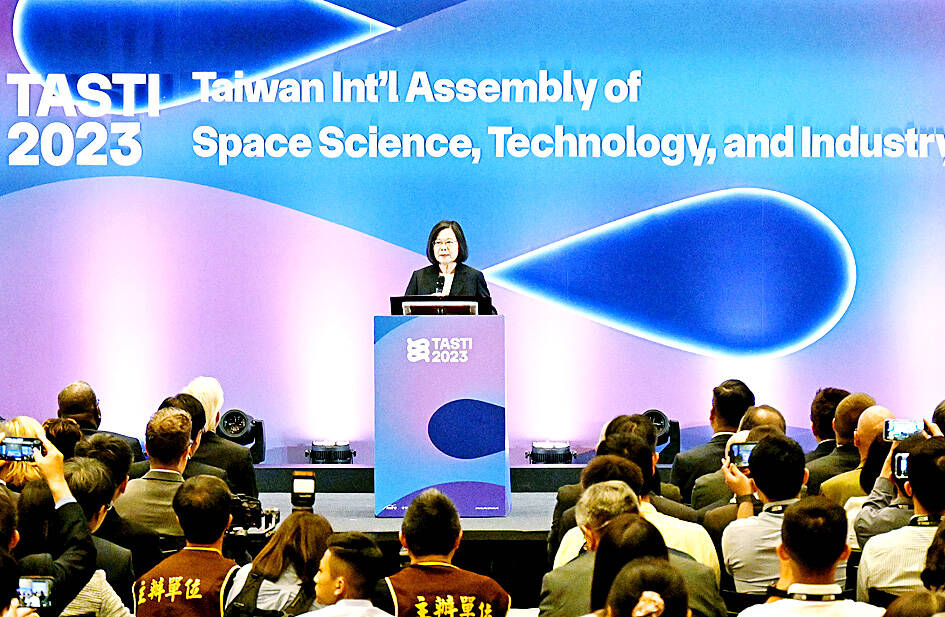The nation’s space development program is to receive an additional NT$40 billion (US$1.23 billion) in funding, President Tsai Ing-wen (蔡英文) said yesterday in a speech at the opening of the Taiwan International Assembly of Space Science, Technology and Industry in Taipei.
The launch of Taiwan’s first domestically produced weather satellite, Triton, earlier this month proves that the nation not only has advantages in semiconductors and precision manufacturing, but also the ability to enter the global space industry, Tsai said.
The additional funding for the third phase of the space development program — initiated in 2019 with an investment of NT$25.1 billion over 10 years — would go into supporting the development of low Earth orbit communication satellites, as well as national launch sites for satellites, she said.

Photo: Fang Pin-chao, Taipei Times
In a keynote speech, US Assistant Secretary of Commerce for Environmental Observation and Prediction Michael Morgan highlighted cooperative space projects that have brought together Taiwanese scientists and US engineers.
For example, the launch of Taiwan’s Formosat-7/COSMIC-2 satellites in 2019 was the largest science technology activity undertaken by Taiwanese and US authorities, Morgan said.
“We have seen that the data from this mission are critical in the operations of NOAA’s [the US National Oceanic and Atmospheric Administration] weather service,” he said.
The satellites reduced errors in global modeling data from NOAA by about 6 percent, he said.
The US Air Force’s 557th Weather Wing also uses this important data, he added.
The NOAA and the Center for Space and Remote Sensing Research at National Central University in Taoyuan are also collaborating on space-based marine oil pollution and marine debris monitoring, he said.
Taiwan’s Triton, also known as the Wind-Hunter Satellite, has potential for retrieving wind data, and assessing soil moisture and flood inundation, he added.
The near-surface wind retrievals are particularly valuable, providing crucial insights into understanding the structure of cyclones over oceans, he said.
“We have identified mutually beneficial collaboration on space weather through the accommodation of space weather instruments on the upcoming TASA [Taiwan Space Agency] and Formosat-8 spacecraft missions,” he said, referring to TASA’s ongoing development of six high-resolution optical satellites, known collectively as the Formosat-8 satellite constellation.
The five-day conference, the largest international showcase for Taiwan’s space industry, brings together public and private sector operators in space technology from countries including India, Japan and the US.
TASA, which hosts the annual conference, says the event serves as a platform for integrating the fields of science, technology and industry in the sector, to attract international attention to Taiwan’s space development and facilitate cooperation.
The conference includes forums, keynote speeches, academic presentations and exhibition booths where satellite and communication industry representatives display their latest developments.

NATIONAL SECURITY THREAT: An official said that Guan Guan’s comments had gone beyond the threshold of free speech, as she advocated for the destruction of the ROC China-born media influencer Guan Guan’s (關關) residency permit has been revoked for repeatedly posting pro-China content that threatens national security, the National Immigration Agency said yesterday. Guan Guan has said many controversial things in her videos posted to Douyin (抖音), including “the red flag will soon be painted all over Taiwan” and “Taiwan is an inseparable part of China,” while expressing hope for expedited “reunification.” The agency received multiple reports alleging that Guan Guan had advocated for armed reunification last year. After investigating, the agency last month issued a notice requiring her to appear and account for her actions. Guan Guan appeared as required,

A strong cold air mass is expected to arrive tonight, bringing a change in weather and a drop in temperature, the Central Weather Administration (CWA) said. The coldest time would be early on Thursday morning, with temperatures in some areas dipping as low as 8°C, it said. Daytime highs yesterday were 22°C to 24°C in northern and eastern Taiwan, and about 25°C to 28°C in the central and southern regions, it said. However, nighttime lows would dip to about 15°C to 16°C in central and northern Taiwan as well as the northeast, and 17°C to 19°C elsewhere, it said. Tropical Storm Nokaen, currently

‘NATO-PLUS’: ‘Our strategic partners in the Indo-Pacific are facing increasing aggression by the Chinese Communist Party,’ US Representative Rob Wittman said The US House of Representatives on Monday released its version of the Consolidated Appropriations Act, which includes US$1.15 billion to support security cooperation with Taiwan. The omnibus act, covering US$1.2 trillion of spending, allocates US$1 billion for the Taiwan Security Cooperation Initiative, as well as US$150 million for the replacement of defense articles and reimbursement of defense services provided to Taiwan. The fund allocations were based on the US National Defense Authorization Act for fiscal 2026 that was passed by the US Congress last month and authorized up to US$1 billion to the US Defense Security Cooperation Agency in support of the

PAPERS, PLEASE: The gang exploited the high value of the passports, selling them at inflated prices to Chinese buyers, who would treat them as ‘invisibility cloaks’ The Yilan District Court has handed four members of a syndicate prison terms ranging from one year and two months to two years and two months for their involvement in a scheme to purchase Taiwanese passports and resell them abroad at a massive markup. A Chinese human smuggling syndicate purchased Taiwanese passports through local criminal networks, exploiting the passports’ visa-free travel privileges to turn a profit of more than 20 times the original price, the court said. Such criminal organizations enable people to impersonate Taiwanese when entering and exiting Taiwan and other countries, undermining social order and the credibility of the nation’s